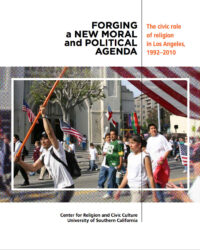A variety of events and political developments since 1995 have served to motivate the faith community to become more active in a public way. Beginning with former President Clinton’s Charitable Choice/ welfare reform legislation in 1996, and continuing through the faith-based initiatives of former President George W. Bush and current President Barack Obama, the opportunity for faith organizations to undertake civic engagement has been aggressively promoted by public agencies, resulting in a larger range of faithbased organizations engaged in public life.5 Public institutions are also increasingly looking to utilize faith-based services, outreach, and leadership because of their unique access to different populations, their presumed effectiveness in a wide range of arenas, and because they may have the organizational ability to deliver specific services to their local community. Beyond political developments, events like 9/11 and the 2006 immigration reform protest marches in Los Angeles have also served as motivators for the inclusion of an even larger and more diverse set of faith organizations to be involved in the public sphere. In particular, Muslim organizations, from mosques to medical clinics, have become more and more involved in interfaith endeavors, and in working on different social justice campaigns in Los Angeles. Also, immigrant residents have capitalized on using organizing skills learned in their home countries to engage issues here in Los Angeles.
More recently, the recession of 2008-2009 has dominated many of the efforts of the faith-based community. Not only are more people out of work, and in need of affordable housing and food, clothing and short-term shelter, but various faith groups have been working with both public agencies and financial institutions to create a system that rewards entities that establish community-minded business strategies. Other groups have worked with nonprofits and financial institutions to establish mortgage modification programs. Faith-based organizations are playing a key role in advocating for the rights of L.A.’s most vulnerable populations.
These expanded efforts resulted in multiple programs, committees and organizations that mirrors the pluralism represented in the Los Angeles faith community. The primary difference between 2010 and 1992 is that faith groups are, in many ways, expected to play a public role in Los Angeles, whereas in the 1990s, there was no such expectation, even though many religious organizations did so on a regular basis and others rose to the challenges presented by the unrest. Today, groups are also expected to fill gaps left by the shrinking ability of public agencies to meet basic needs. Further, in 2010, there are not only many different faith groups—both congregations and FBOs—but there are seemingly almost as many different approaches to addressing pressing issues, each within their own networks and with varying levels and kinds of success in their endeavors. The result is that as opposed to the citywide efforts at unity in 1992, there is now a greatly expanded, though fragmented, imperative for faith-based groups to effect positive social change.
5 For different analyses of the faith-based initiative efforts, see for example, Lew Daly, God’s Economy: Faith-Basd Initiatives and the Caring State, Chicago: University of Chicago Press, 2009; John J. DiIulio, Godly Republic: A Centrist Blueprint for America’s Faith-Based Future, Berkeley and Los Angeles: University of California
Press, 2007; Rebecca Sager, Faith, Politics, and Power: The Politics of Faith-Based
Initiatives, New York: Oxford University Press, 2010.
Richard Flory is the executive director of the USC Center for Religion and Civic Culture.
Brie Loskota is the former executive director (2016-2021) of the USC Center for Religion and Civil Culture.
Donald E. Miller is the co-founder of the USC Center for Religion and Civic Culture.
